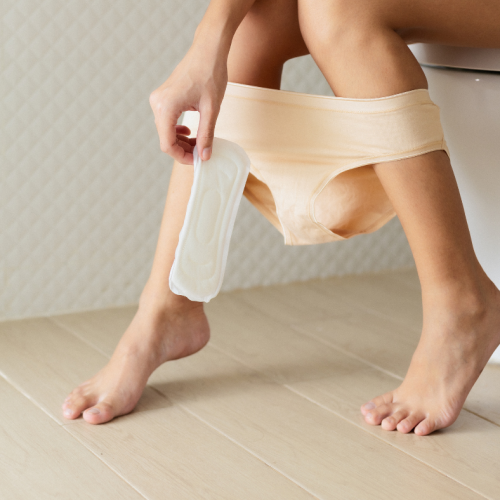Lochia (Postpartum Discharge/Bleeding)
Lochia is the vaginal discharge you have after giving birth. It contains a mixture of blood, mucus, and uterine tissue. It has a stale, musty smell like menstrual discharge and can last for several weeks.
The lochia is strong at first, but gradually subsides until it disappears completely. Lochia is a normal part of the healing process after childbirth and usually does not cause complications.
3 stages of lochia
The duration of each stage and the way lochia looks can vary.
Lochia rubra is the first stage of lochia. You can expect:

- Dark or bright red blood
- Lasts for three to four days
- Flows like a heavy period
- Small clots are normal
- Mild, period-like cramping
Lochia serosa is the term for the second stage of lochia. You can expect:
- Pinkish brown discharge that’s less bloody looking
- Thinner and more watery than lochia rubra
- Lasts for four to 12 days
- Flow is moderate
- Less clotting or no clots
Lochia alba is the last stage of lochia. You can expect:
- Yellowish white discharge
- Little to no blood
- Light flow or spotting
- Lasts from about 12 days to six weeks
- No clots
What is lochia made of?
Lochia is postpartum bleeding and discharge. Your uterus is essentially “starting fresh” and shedding any blood, tissue and other materials from months of pregnancy. Lochia is made up of:
- Blood
- The tissue lining of your uterus
- Amniotic fluid
- Bacteria and microorganisms
- Any leftover fetal membranes
- Cervical mucus
Lochia will smell like menstrual blood. Some describe it as musty, metallic, sour, or stale. However, it should not smell fishy or foul. This could mean that bacteria have entered your vagina and caused an infection.
How long does lochia last?
The duration of lochia can vary from person to person, but it usually lasts about six weeks. However, some people have traces of lochia for up to eight weeks.
When to seek medical help
Lochia does not usually cause complications. The amount of bloody discharge should decrease on its own until it has completely subsided. However, there are signs of abnormal bleeding or discharge that you should watch for.
Contact your doctor if you experience the following symptoms in the weeks after giving birth:
- Greenish vaginal discharge
- Foul-smelling odor (worse smelling than your usual period)
- Excessive bleeding or discharge (soaking a pad every hour)
- Large, golf-ball-sized clots or excessive clotting
- Fever, chills or flu-like symptoms
- Swelling or pain around your vaginal area
- Dizziness or feeling like you may faint
- Excessive cramping or pelvic pain
Do you bleed less if you had a C-section?
If you delivered by cesarean section (C-section), you will still bleed for a few weeks, but possibly less than if you delivered vaginally. You should still expect dark red blood that gradually changes from brown to yellow to white as the weeks go by.
Treatment at A7 Health for Core Strengthening after Pregnancy:
Get Physiotherapy – Book an appointment with a Physiotherapist at A7 Health who will assess you in a 45 minute consultation and provide treatment alongside a treatment plan to correct the muscle separation and strengthen your core. Some of the treatments include:
- Massage for pain relief.
- Mobilisations on any stiff joints such as your hips, lumbar spine joints or the sacroiliac joint (SIJ).
- Pelvic floor strengthening exercises
- Strengthening exercises for your abdominal muscles.
Join an exercise class (with a Biokineticist) – Moderate exercise, such as walking, has been shown to help restore core strength after pregnancy. Stretching can help relieve sore muscles. Join an exercise class led by an A7 Health Biokineticist who will teach you exercises that will strengthen and relax muscles and help you to reduce the likelihood of pain after your pregnancy. These exercises will also help you with recovery after you give birth.
